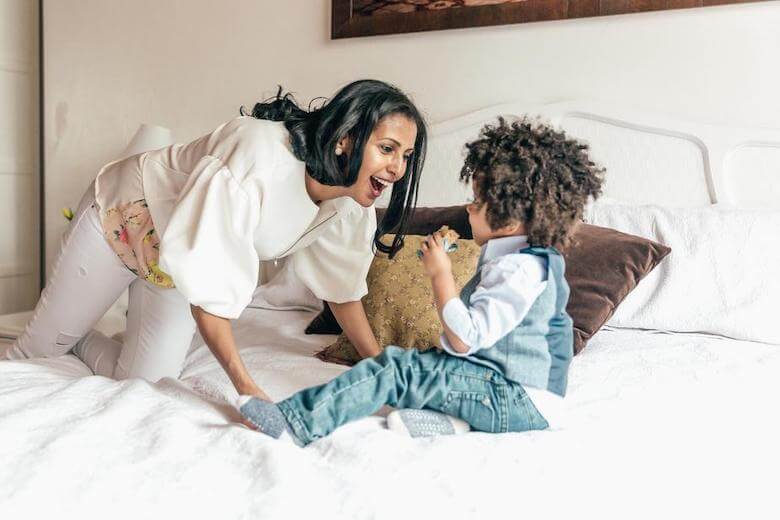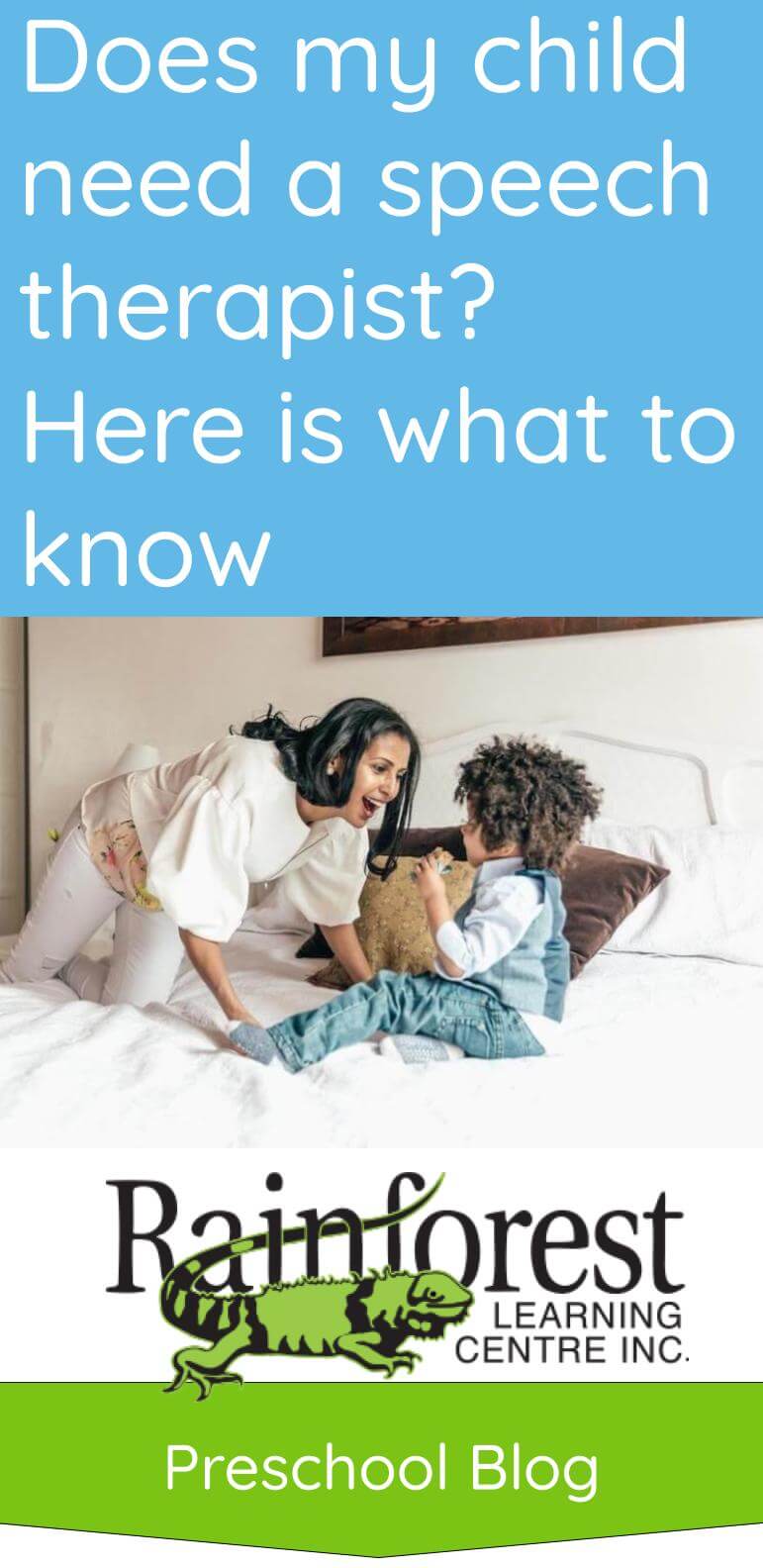
Worried that you can’t understand your child and wondering, “does my child need a speech therapist?”
We’ve discussed developmental milestones before. Parents can be easily concerned that their child is not ‘matching up’ to the norms of growth and development. In a way, this is a good thing, if it means earlier intervention, when there is a serious issue. But other times, it can be normal – some kids are simply later than others in certain developments, and that’s ok.
Parents simply need to be educated on what to look out for when it comes to issues like speech problems in a toddler or preschooler. In this article, we’ll give a few tips on what to know about speech and language development, and when to see a doctor, if you need to.
The clues to speech problems in toddlers and preschoolers are not always obvious, but they are noticeable
Of course, babies, toddlers and even preschoolers are just learning to talk. So it is expected that they will have some trouble saying or remembering words. That’s normal. For example, the infamous “w” sound for the “r’ letter in words, or the preschooler ‘lisp.’ Think: “wabbit” instead of “rabbit.” Eventually, most children with these speech habits grow out of them.
Not only that, but one, two and three-year-olds are very commonly hard to understand. You’ve probably seen parents act as ‘interpreters’ for their children when they sound unintelligible, but are speaking with such seriousness or enthusiasm. For example, see this video of a two-year-old on the Ellen show, who is a genius, but no one can understand him until his parents ‘translate’!
But, there are certain milestones to look out for, that would be cause for concern. And, when they happen, you’ll likely sense that something is wrong. We’re not all baby experts by the time we become parents. But we do generally have a sense of what a healthy one-year-old should be doing, versus a healthy five-year-old.
So, with that in mind…
Look for these signs of speech competencies in toddlers and preschoolers:
By 6 – 12 months your child should:
- Understand how to pass things to you through gestures.
- Imitate sounds.
- Make sounds repetitively, especially vowel noises (e.g. that period when we’re convinced our babies are calling us “mamamamama” or “dadadada”).
- Point to things they want.
By 12 months your child should:
- Say a few words, especially easy ones they’ve been exposed to a lot, like “mama” and “dada” (for real this time!). Or “no” and “ball.”
- Learn to shake their head or say “ya!” for no or yes.
- Start making sounds outside the basic vowels.
- Understand or make gestures such as waving goodbye, giving high fives or blowing kisses.
By 18 – 24 months your child should:
- Be expanding their vocabulary. They should know 50 – 200 words.
- Be able to express themselves more. For example, making strong objections to certain foods or brushing their teeth.
- Using words they already know to attempt to communicate, such as “all done” when they don’t want something.
- Can follow very simple instructions, such as “get the ball” or “can I have a kiss?”
- Be able to point to objects they understand, even if they can’t say them.
By three years old your child should:
- Have grown their vocabulary significantly, up to around 2000 words.
- Start asking questions (this may come closer to age four, however).
- Start having two-way conversations. For example, they may initiate taking turns with another child to toss a ball.
- Can follow more instructions, even two or three-step instructions.
- Be understandable by you, and some outsiders, for most of what is said (they may still mispronounce words).
By four years old your child should:
- Start using complete sentences (even if grammar is a bit off, or they are short).
- Start giving explanations, even if they can’t completely name their feelings. For example, they may say “I don’t like it!” when they can’t explain why they don’t want to play with others all of a sudden.
- Start telling stories, even if they are pretending to ‘read’ books they don’t actually know how to read (but they may remember how it goes, or want to fill in the story with their own imaginations).
- Comprehend and follow directions that are more complex, such as “if you eat all your peas, maybe later we can watch your favourite cartoon and eat popcorn and ice cream for dessert!”
- Be understandable by most people outside the family.
By five years old your child should:
- Say intelligible sounds and be expressive with their language and needs.
- Understand a sense of time, such as the past, yesterday, or tomorrow. They may even talk about what they remember happening at some point in the past, or what they are looking forward to. This may come at age four.
- Converse with other children and have intelligible conversation with outsiders.
- Show an interest or ability to learn letters and words (they may have begun this earlier, however).
The time to be concerned about speech development is when your child:
- Doesn’t explore vocal chords with meaningless noise as a baby.
- Doesn’t show emotion or non-language communicative skills, even as a baby. For example, they don’t respond to peek-a-boo by age one, or don’t giggle at funny noises they’ve never heard before, and so on.
- Won’t point or use hand gestures by 18 months, even for pointing at what they want, or shaking their head for “no.”
- Won’t use speech or vocal skills to try to communicate. Or they can only imitate your sounds in one-on-one sessions, but not initiate speech by themselves, by age two.
- Follow instructions at the appropriate developmental milestones.
- Does not seem to be able to hear you or notice when you are talking to them.
- Sounds raspy, ‘clogged’ in the nose, or stutters when making oral noise.
- Is very anti-social.
If you feel your child falls into the above concerns, or isn’t meeting the milestones for their age, you should see a doctor as a first step. They’ll be able to guide you, and refer you to a speech pathologist (i.e. a speech therapist). From there, more investigation will take place, so that you can learn what is wrong. These individuals will be trained to watch for more signs of speech delay, and to figure out what is causing it.
What to expect from a speech pathologist or speech therapist
A speech pathologist, or speech therapist, will be looking at more than your child’s words or pronunciation. They will be looking at various aspects of communication, including expression, and comprehension.
They will be focused on two aspects of communication which could be creating speech difficulties:
- Physical problems with the mouth, such as an under-developed tongue, an ear infection, or hearing loss.
- Cognitive problems or learning difficulties, such as Autism Spectrum Disorder, dyslexia, apraxia, or other special needs cases.
Common problems affecting speech are listed in this article.
They will most likely ‘figure out’ your child through play sessions. This is also how therapy is usually conducted. They do this because children express themselves through play, by their very nature. They also are at ease, and don’t feel like they are being ‘watched’ or under examination in this type of environment. During a play sequence, the speech therapist may then throw in a question, or try to get a child to make a sound, to be able to investigate their speech problem.
Here is a video that shows a little bit of a speech therapy session, with some explanation: https://youtu.be/xiKYD9TSDhk
To conclude: speech language delays in early childhood can be addressed, once they are diagnosed
The good news about all of the above is that if your child does turn out to have a speech delay, they can likely be treated.
Early intervention is key – whether the problem is physical or cognitive. While we would not want you to worry needlessly, we also would not want you to ‘wait it out.’ As we often say, it is better to be safe than sorry. Speaking with your doctor about a concern like this would be harmless, even if it turns out to be nothing.
See related on our blog:
- What is cognitive development in early childhood?
- What are cognitive developmental milestones in early childhood?
- Why sensory development skills are important at daycare
- What is normal gross motor development in early childhood, and why is it important?
- What are normal fine motor skills to have in the early childhood years, and why are they important?
- Why is literacy crucial in the early years? How can parents and preschools help with reading skills?
- How to recognize early vision problems in toddlers and preschoolers
